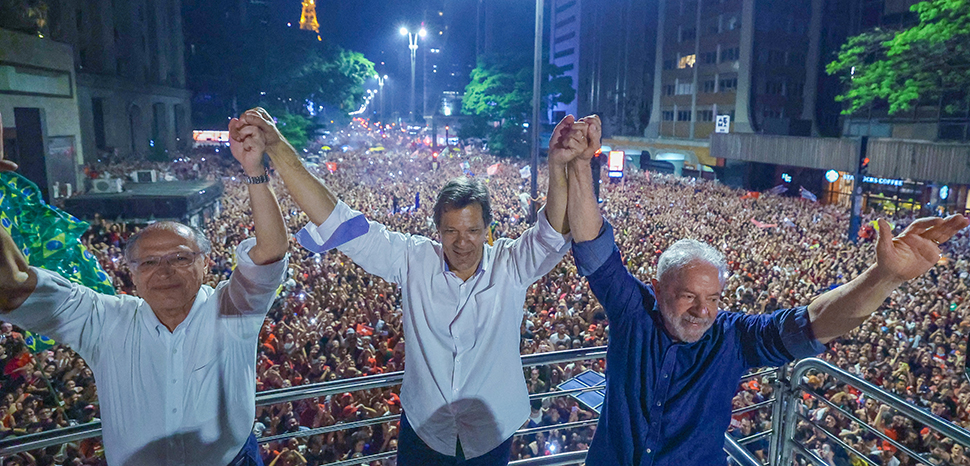A recent article on Geopolitical Monitor argues that Brazil’s far-right president, Jair Bolsonaro, who was defeated in Brazil’s recent election, would preside over a hectic transition until president elect Luis Inácio Lula da Silva takes charge in January, 2023.
This contention, according to the author, hinges on various evidence: (a) Brazilian people yearned for change in the executive branch such that Bolsonaro’s extremism did not matter when he was elected; (b) elements of right-wing authoritarianism, such as military cults, nostalgia, and extremely conservative social movements are common in our Brazilian lives; (c) Bolsonaro repeated attacks on the integrity of Brazil’s election process could cause something similar to the attacks on US Capitol after Trump’s defeat in 2021.
I take these statements with a grain of salt; moreover, the article leaves a few major questions unanswered, such as: Why is there uncertainty over who will be Brazil’s next president? Are there elements and patterns that could illuminate the facts surrounding Bolsonaro’s authoritarianism – theoretically and practically? What is the relationship between Brazil’s political institutions and the supposed threat posed by Bolsonaro?
First and foremost, we should begin with a discussion on whether Brazilian institutions are able to respond accordingly to Bolsonaro’s threat. During the polls, the president affirmed, without evidence, that the election could be rigged and he might not accept defeat. Millions of followers swore to take to the streets at his command.
When voting returns showed that the incumbent president had been removed from office after just one term, the Brazilian government responded in a joint, rapid, and decisive manner. The Senate, Attorney General, Supreme Court justices and Electoral Court officials came together on television and announced Lula as the winner. The Speaker of the Legislative, perhaps the president’s most important ally, then read a statement reiterating that the voters had spoken. Other right-wing politicians quickly followed suit. Politically isolated, President Jair Bolsonaro was silent for two days. Then, under pressure from his top advisers, he agreed to the transfer of power.
Thousands of his supporters took to the streets, blocking roads and demanding military intervention, but the armed forces showed no interest in disrupting the electoral process. With similar chaos forecast in the United States, Brazilians beefed up their electoral system well ahead of time. Government leaders added additional tests to the polls and checks on the results, standardized voting times so that votes arrived quickly, and planned to present a united front once the winner was declared. In many US states, voters use paper ballots, which can slow counts, and the use of abstention ballots has also increased sharply in 2020 due to the pandemic. As a result, the outcome of the election was uncertain for days.
Brazil on the other hand is the only country in the world to use a fully digital system without paper copies, which allows results within hours of the polls closing. This project was precisely what Bolsonaro and his allies attacked as a dangerous failure. They argued that without paper copies, no one could be sure that their vote had been counted correctly.
In Brazil, a Supreme Court judge led an aggressive crackdown on misleading and fake news. Alexandre de Moraes, who is also the current president of Brazil’s Superior Electoral Court, ordered tech companies to take down thousands of posts, with little room for appeal, in what he said it was an attempt to combat “fake news” which threatens Brazil’s democracy. As a result, he has become one of the most powerful arbiters in any global democracy over what can be said online. A week before the vote, several electoral officials granted him the unilateral power to suspend any technology company in Brazil if it failed to comply with his orders to take down a post within two hours.
Disinformation still flowed, but likely in far less volume than if Moraes had not acted. However, his blunt approach drew widespread complaints from the Brazilian right that he had, in fact, manipulated the election, censoring conservative voices. What is clear is that he dramatically expanded the power of Brazilian courts over online discourse and, at times, issued rulings that raised concerns over whether his efforts to protect democracy represented a threat in their own right.
A successful coup requires many different elements working in tandem. This was not the case in Brazil.
The fear of a coup was plausible because Bolsonaro put the security and intelligence services under his direct authority – such as the Federal Police, the Federal Highway Policy and ABIN (Intelligence Agency in Brazil) – and deepened the symbiosis with the armed forces, guaranteeing pharaonic salaries to the generalship and distributing remunerated functions to high and low ranks. In the states, the strength of “Bolsonarism” in the civil and military police made it possible to form a large pro-Bolsonaro armed corps, complemented by armed civilians, gangs organized into CACs (Hunters, Shooters, and Collectors) and even by militia paramilitarism in states like Rio de Janeiro.
At the international level, the attempt to take the US Capitol by Donald Trump supporters on January 6, 2021, fueled the Bolsonarist daydream of invading the National Congress and the Federal Supreme Court, leading its leader to full power. Bolsonaro may have tried or wanted a coup, pushed by the clamor of his supporters. However, this expectation has been dissolving as the highways were cleared, as Bolsonarist groups become disillusioned with the lack of reaction to the “myth,” in which civil society (and organized supporters and delivery workers) react in a coordinated manner.
For a coup d’état to be successful, many elements have to be combined.
At the economic level, there must be an alignment of national capital with international actors who share a mutual interest in the breaking of the democratic regime.
At the military and security level, ideological motivation, financial support from national and international capital, and promises of foreign military support are needed.
From a diplomatic point of view, it is necessary that the richest and militarily stronger countries to see the geopolitical and/or economic advantage of the coup.
From a societal point of view, a highly motivated mass mobilization is needed to support the coup plotters or, with similar effect, a silent majority that passively accepts or approves it.
From a political point of view, it is typical to have a great fragmentation of democratic forces, which preclude the formation of sweeping coalitions or broad fronts.
Finally, from the media perspective, it is essential that large corporations, with interests associated with national elites and foreign capital, are broadly in favor of the coup.
Yet this is simply not the case in Brazil today. If it is true that “Bolsonarism” managed to penetrate large areas of national capital, civil society, and the security forces, it did not achieve the hegemony necessary to advance an agenda of the suspension of the democratic order. Many of the ingredients listed above were missing.
Soon after the results of the second round were released, heads of state from central countries and world political personalities rushed to congratulate Lula on his victory. In Brazil, political leaders allied to Bolsonaro signaled a willingness to talk and to compose a new government. The market reacted positively, with the dollar falling and equities receiving a boost. Even “Bolsonarist” evangelical pastors congratulated the elected president.
Bolsonaro was thus revealed to be wearing no clothes.
It is, indeed, time for Bolsonaro to go quietly. However, the truth is that the economic, political, and ideological forces that, since 2018, have been represented by his figure have become all the stronger due to his time in government. Brazilian democrats, exhausted by the efforts of recent years, will have to quickly find new strength because the struggle for the consolidation of democracy and the republic in Brazil is far from over.
Geopolitics under Lula
When Lula returns to the presidency on January 1, 2023, his third term will signal a likely return to the South-South diplomacy that characterized his previous terms, in which Lula self-identified as a leader of the Global South. He is expected to increase collaboration between Brazil and other governments with similar perspectives, such as Argentina, Chile, Mexico and Colombia. Characterizing Lula’s election as part of a shift to the left in the region oversimplifies the state of regional politics. Instead, the change is a sign that people want leaders who think they will rule with a deeper interest in improving the lives of ordinary people, especially amid rising food and energy prices.
As in Colombia, the Biden administration is expected to send a steady stream of high-level representatives to Brazil to meet with Lula and his team. It is an essential moment to reinforce the importance of US-Brazil ties. The White House took an important step in that direction with a quick statement congratulating Lula shortly after he was declared the winner. With concerns about whether the results would be as expected, this was an important move by the United States; many European and Latin American governments have done the same. Lula made it clear that he sees the United States and Europe as valuable partners for Brazil, especially in the areas of trade and environmental cooperation. In the next government, Brazil’s engagement with Latin America and the Caribbean will depend on ideological affinity, but also on pragmatic areas of collaboration.
Closer China-Brazil relations expected
Under Lula, two new priorities must emerge in Brazilian foreign policy: sustainability, from a substantive point of view, and South America, from a geographical point of view. Both priorities mark a departure from Bolsonaro’s worldview; both reflect Lula’s understanding that Brazil needs to rebuild its international reputation as well as its ability to influence global and regional discussions. Lula’s narrative will likely place significant emphasis on restoring Brazil’s credibility abroad.
Furthermore, Lula is expected to take a different approach to China-Brazil relations, deepening bilateral ties in areas beyond the economy.
Despite negative rhetoric against China during the Bolsonaro administration, trade and investment between the two countries has largely evolved undisturbed. However, the political noise generated by the anti-China discourse has impeded the deepening of bilateral relations in other areas of policy, such as science and technology. The strong economic relationship between the two countries does not correspond to their less intense political relationship; a trend that deepened during the Bolsonaro years. Under Lula, we can expect Brazil and China to explore other areas of cooperation.
The future of the BRICS grouping of developing economies could also take a different turn under Lula. While Bolsonaro has never rejected other BRICS countries, his priorities have focused elsewhere, particularly in promoting Brazil’s membership within the Organization for Economic Cooperation and Development. It is unclear how the new government will view China’s effort to expand the BRICS and shape it as a counterweight to the West. It is clear, however, that the Lula government will see the BRICS as an important platform not only to improve dialogue among its participants, but also to influence global discussions.
Would Brazil be willing to join the Belt and Road Initiative (BRI)? It remains to be seen how far Lula would go in this regard. It may be that Brazil has a more positive approach to the Chinese initiative. That said, Brazil could consider collaborating or supporting BRI projects, including in other countries, without formally joining the initiative.
Lula’s efforts to promote Brazil’s reindustrialization may cause some friction with China, but in general this should not derail bilateral relations, in part because of the powerful agribusiness sector. One of Lula’s main challenges is leveraging Chinese investments and technologies to help reinvigorate Brazilian industry. Sustainability also offers renewed opportunities for cooperation with China, which Lula is likely to explore.
In Brazil, the readjustment of foreign policy is becoming a new consensus. China will remain at the forefront of Brazil’s foreign policy. Brazil needs more foreign investment to help it improve its infrastructure and increase its international competitiveness. In 2021, Brazil will become China’s largest investment destination. In one year, Chinese companies poured more than $5.8 billion into Brazil’s main industries, such as electricity, oil and information technology. During the presidential election, Lula had a clear stimulus plan for Brazil’s traditional industries such as car manufacturing, petroleum gas, aviation, and communications manufacturing, as well as so-called clean technologies such as solar energy. Not only do Chinese companies have expertise in these fields, but more importantly, they already know the Brazilian economy very well and show continued interest in increasing investment in Brazil.
In the field of relations with China, the newly appointed Brazilian president must balance US-Brazil relations and China-Brazil relations. Washington does not want to see its main rival, China, increase its influence in Latin America and Brazil. Both Trump and his successor Biden administrations have pressured Brazil to exclude Chinese companies, such as Huawei, from Brazil’s 5G rollout. More US diplomatic pressure is likely to follow Brazil’s attempts to improve relations with China and deepen China-Brazil economic and trade cooperation.
For Brazil, strengthening ties with China and the United States remains the goal. A stronger bilateral relationship would give Brazil greater leeway and negotiating power in protecting its strategic interests in Asia and in global affairs. Nonetheless, it remains to be seen how well the new Brazilian president will balance relations with China without generating blowback from Washington.




